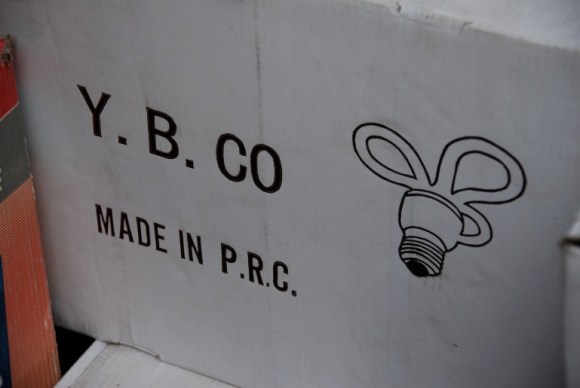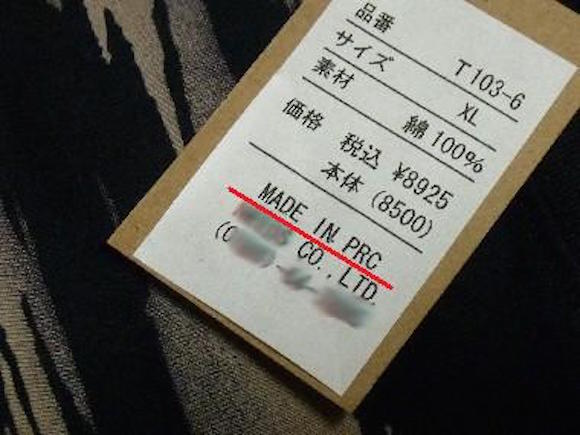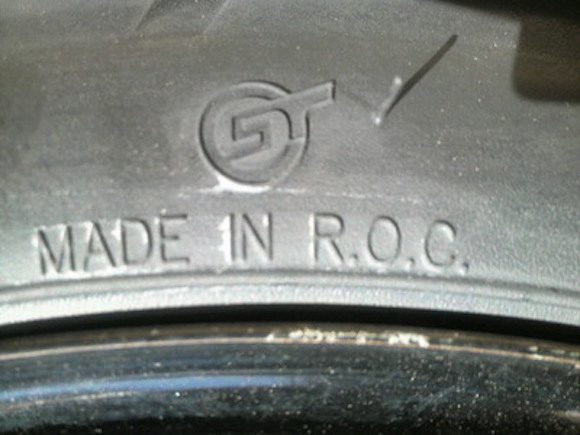
In today’s globalized economy, it’s perfectly normal to be wearing shoes made in Malaysia, listening to an American pop star on a Korean smartphone while driving a German car fitted with Japanese tires. But how many times have you taken a good look to find out where those new jeans or those headphones you got for Christmas were really made?
Recently Japanese consumers have been discovering that some of their products are from “P.R.C.,” a country they had never heard of, and would like some answers on what appears to be a legal gray zone in product labeling regulations.
Although still not as confusing an anthropromorphic pear currently having a hit song in Japan, a linguistic loophole of sorts has been allowing some products produced in China to be labeled in English as “Made in P.R.C.” Referring to China’s official name, the People’s Republic of China, the label is accused by some consumer advocates as being misleading. They say it’s a disingenuous attempt to rebrand the country after a series of food scandals tainted the image of Chinese-made goods around the world.
▼ Is this piece of clothing still worth almost 9,000 yen (US$74) if you knew it was made in China?

Typically in Japan, goods from China are labeled 中国産 (chugokusan), literally meaning “produce of China”. But some Chinese manufacturers seem to be piggybacking off the more commonly seen wording for products in Japan from the United States of America—Made in U.S.A. These Chinese manufacturers could argue that, just like “U.S.A.,” they have every right to use the abbreviation of their country’s official name, in English, when identifying where their products come from.
▼ The practice of using the English abbreviation of a country’s official name is not unheard of, like these tires from Taiwan stamped with its formal name—Republic of China

According to Harumi Hori, a corporate lawyer in Tokyo, the proliferation of goods with the “Made in P.R.C.” really started sometime after January 2008 when frozen packaged gyoza dumplings from China were recalled amidst a food poisoning scare. The “new” label may have been made to appeal to Japanese consumers who were starting to avoid all products coming out of China.
Although safety regulators in Japan require food manufacturers to clearly label the country of origins of all food in Japanese, other products do not fall under the same regulation. And since P.R.C. is just as legitimate an abbreviation as U.S.A., regulators are hesitant to call the “Made in P.R.C.” label “misleading.” Hori and other consumer advocates would like labeling regulations to be equal across all industries, requiring Japanese to be used when identifying which country made the product in a customer’s hands.
The confusion about the label has caused a number of products on online shopping sites, such as Yahoo! Shopping or Amazon Japan, to be labeled “Made in China,” but “Made in P.R.C.” on the actual physical package and vice versa. When contacted by the Japanese economic newspaper Sankei Shimbun, a company spokespersons said that there are no regulations prohibiting such labeling. The Japanese online retailer Rakuten said that it is the responsibility of the manufacturers themselves to identify where the product is made.
The Consumer Affairs Agency of Japan, which regulates the labeling of products, has said that while consumers may have a “low degree of familiarity” with the term P.R.C., the phrase does not appear to be in violation of the rule that prohibits misleading wording about a product’s origin. Consumers trying to avoid Chinese-made goods are now trying to increase awareness that a product made in “P.R.C.” is actually from China.
▼ This dramatic video (evidently from someone not too fond of Chinese products) makes the point quite clear that PRC and China are the same
Are Japanese consumers overreacting to something they should have perhaps learned in middle school social studies class? Or are Chinese manufacturers just trolling the China haters? Without a clear judgement from regulators on whether product labels can use the abbreviation of a country’s formal, but not as commonly known, name, the “Made in P.R.C.” label seems like it is here to stay.
Source: Yahoo! Japan News
Feature Image: Seesaa blogs (ooruri777)

 10 things Japan does better than anywhere else, according to the international community
10 things Japan does better than anywhere else, according to the international community Japan set to receive amazing ribbon bow Coca-Cola bottles for Christmas this year【Video】
Japan set to receive amazing ribbon bow Coca-Cola bottles for Christmas this year【Video】 A Warm Notice from your friends at Star Hotel
A Warm Notice from your friends at Star Hotel China is trying to build an empire of electric cars—but the strategy has one huge flaw that will benefit Tesla
China is trying to build an empire of electric cars—but the strategy has one huge flaw that will benefit Tesla Japan’s new difficult-to-drink-from beer glass protects your liver, but it’s a brutal experience
Japan’s new difficult-to-drink-from beer glass protects your liver, but it’s a brutal experience How to order snacks on a Shinkansen bullet train in Japan
How to order snacks on a Shinkansen bullet train in Japan New samurai glasses are Japan’s latest weird must-have souvenir
New samurai glasses are Japan’s latest weird must-have souvenir New Pokémon ice cream, dessert drinks, and cool merch coming to Baskin-Robbins Japan【Pics】
New Pokémon ice cream, dessert drinks, and cool merch coming to Baskin-Robbins Japan【Pics】 Doraemon found buried at sea as scene from 1993 anime becomes real life【Photos】
Doraemon found buried at sea as scene from 1993 anime becomes real life【Photos】 Burger King Japan suddenly adds Dr. Pepper and Dr. Pepper floats to its menu nationwide
Burger King Japan suddenly adds Dr. Pepper and Dr. Pepper floats to its menu nationwide Starbucks Japan welcomes alpacas for cute summer drinkware line【Photos】
Starbucks Japan welcomes alpacas for cute summer drinkware line【Photos】 High-fashion Totoro cuddle purse is like an elegant stroll in the forest【Photos】
High-fashion Totoro cuddle purse is like an elegant stroll in the forest【Photos】 Studio Ghibli hair accessories keep your style tidy with help from Kiki, Moro, Calcifer, and more
Studio Ghibli hair accessories keep your style tidy with help from Kiki, Moro, Calcifer, and more What if Sailor Moon characters were lingerie models? They’d look stunning like this 【Photos】
What if Sailor Moon characters were lingerie models? They’d look stunning like this 【Photos】 Nintendo history you can feel – Super NES, N64, and GameCube controllers become capsule toys
Nintendo history you can feel – Super NES, N64, and GameCube controllers become capsule toys Hello, cosmetics! Clinique teams up with Hello Kitty this summer for first-time collaboration
Hello, cosmetics! Clinique teams up with Hello Kitty this summer for first-time collaboration Demon Slayer: Kimetsu no Yaiba gets new roller coaster attractions and food at Universal Studios Japan
Demon Slayer: Kimetsu no Yaiba gets new roller coaster attractions and food at Universal Studios Japan “The most Delicious Cup Noodle in history” – Japan’s French Cup Noodle wins our heart【Taste test】
“The most Delicious Cup Noodle in history” – Japan’s French Cup Noodle wins our heart【Taste test】 Starbucks releases a cute Frappuccino and Unicorn Cake…but not in Japan
Starbucks releases a cute Frappuccino and Unicorn Cake…but not in Japan Kyoto Tower mascot termination reveals dark side behind cute Japanese characters
Kyoto Tower mascot termination reveals dark side behind cute Japanese characters McDonald’s Japan’s Soft Twist Tower: A phantom ice cream only sold at select branches
McDonald’s Japan’s Soft Twist Tower: A phantom ice cream only sold at select branches Yabai Ramen: What makes this Japanese ramen so dangerous?
Yabai Ramen: What makes this Japanese ramen so dangerous? Finally! Nintendo Japan expands Switch 8-bit controller sales to everybody, Online member or not
Finally! Nintendo Japan expands Switch 8-bit controller sales to everybody, Online member or not Japanese government wants to build luxury resorts in all national parks for foreign tourists
Japanese government wants to build luxury resorts in all national parks for foreign tourists To combat declining birth rate, Japan to begin offering “Breeding Visas” to foreigners
To combat declining birth rate, Japan to begin offering “Breeding Visas” to foreigners 10 things you should buy at 7-Eleven in Japan
10 things you should buy at 7-Eleven in Japan Studio Ghibli releases anime heroine cosplay dresses that are super comfy to wear
Studio Ghibli releases anime heroine cosplay dresses that are super comfy to wear Woman charged for driving suitcase without a license in Osaka
Woman charged for driving suitcase without a license in Osaka Studio Ghibli unveils My Neighbour Totoro miniature house model
Studio Ghibli unveils My Neighbour Totoro miniature house model Kyoto experiencing problems with foreign tourists not paying for bus fares, but not on purpose
Kyoto experiencing problems with foreign tourists not paying for bus fares, but not on purpose Fighting mild hunger with a Japanese soda that turns into jelly in the stomach【Taste test】
Fighting mild hunger with a Japanese soda that turns into jelly in the stomach【Taste test】 Studio Ghibli’s Howl’s Moving Castle tapestry unveiled in Japan for first time
Studio Ghibli’s Howl’s Moving Castle tapestry unveiled in Japan for first time McDonald’s new Happy Meals offer up cute and practical Sanrio lifestyle goods
McDonald’s new Happy Meals offer up cute and practical Sanrio lifestyle goods Sales of Japan’s most convenient train ticket/shopping payment cards suspended indefinitely
Sales of Japan’s most convenient train ticket/shopping payment cards suspended indefinitely Sold-out Studio Ghibli desktop humidifiers are back so Totoro can help you through the dry season
Sold-out Studio Ghibli desktop humidifiers are back so Totoro can help you through the dry season Japanese government to make first change to romanization spelling rules since the 1950s
Japanese government to make first change to romanization spelling rules since the 1950s Foreigner’s request for help in Tokyo makes us sad for the state of society
Foreigner’s request for help in Tokyo makes us sad for the state of society Ghibli founders Toshio Suzuki and Hayao Miyazaki contribute to Japanese whisky Totoro label design
Ghibli founders Toshio Suzuki and Hayao Miyazaki contribute to Japanese whisky Totoro label design Tokyo’s most famous Starbucks is closed
Tokyo’s most famous Starbucks is closed Princesses, fruits, and blacksmiths: Study reveals the 30 most unusual family names in Japan
Princesses, fruits, and blacksmiths: Study reveals the 30 most unusual family names in Japan Japanese company prohibits employees from smoking on their commute to the office
Japanese company prohibits employees from smoking on their commute to the office Johnnie Walker takes a walk through Japan with beautiful Japan Limited Edition whisky
Johnnie Walker takes a walk through Japan with beautiful Japan Limited Edition whisky Cheapo News: Tokyo Grocer selling “expired” items for pennies on the dollar
Cheapo News: Tokyo Grocer selling “expired” items for pennies on the dollar We attach chemical butt-warmers to our crotches but really should know better
We attach chemical butt-warmers to our crotches but really should know better Universal Studios Beijing opens for business, but can we call it “USB?”
Universal Studios Beijing opens for business, but can we call it “USB?” Pretty pink coffins to sleep in now on sale in Japan, made by local Tokyo craftsmen【Photos】
Pretty pink coffins to sleep in now on sale in Japan, made by local Tokyo craftsmen【Photos】 Fear of food produced in China continues as new report claims at least 48% of it will make you sick
Fear of food produced in China continues as new report claims at least 48% of it will make you sick Mt. Fuji jelly makes Japan’s most famous mountain a delight to look at and taste!
Mt. Fuji jelly makes Japan’s most famous mountain a delight to look at and taste! Pet treats from China pulled from shelves, suspected in the illness/death of thousands of dogs
Pet treats from China pulled from shelves, suspected in the illness/death of thousands of dogs Japan officially declared coronavirus-infected nation by Micronesia, travel restrictions enacted
Japan officially declared coronavirus-infected nation by Micronesia, travel restrictions enacted Move over pumpkin, it’s time for some frothy apple cinnamon goodness … in a bottle!
Move over pumpkin, it’s time for some frothy apple cinnamon goodness … in a bottle! 16 facts about China that will blow your mind
16 facts about China that will blow your mind Japanese sake brewery launches One Cup Rainbow in honour of the LGBTQ community
Japanese sake brewery launches One Cup Rainbow in honour of the LGBTQ community McDonald’s officially reprimanded by Japanese government for misleading “roast beef” ads
McDonald’s officially reprimanded by Japanese government for misleading “roast beef” ads We try “The Dream,” Asahi’s new, purportedly “perfect” beer【Taste Test】
We try “The Dream,” Asahi’s new, purportedly “perfect” beer【Taste Test】 U.S. military in Japan bulk buys Japanese scallops as China’s Japanese seafood ban continues
U.S. military in Japan bulk buys Japanese scallops as China’s Japanese seafood ban continues
Leave a Reply